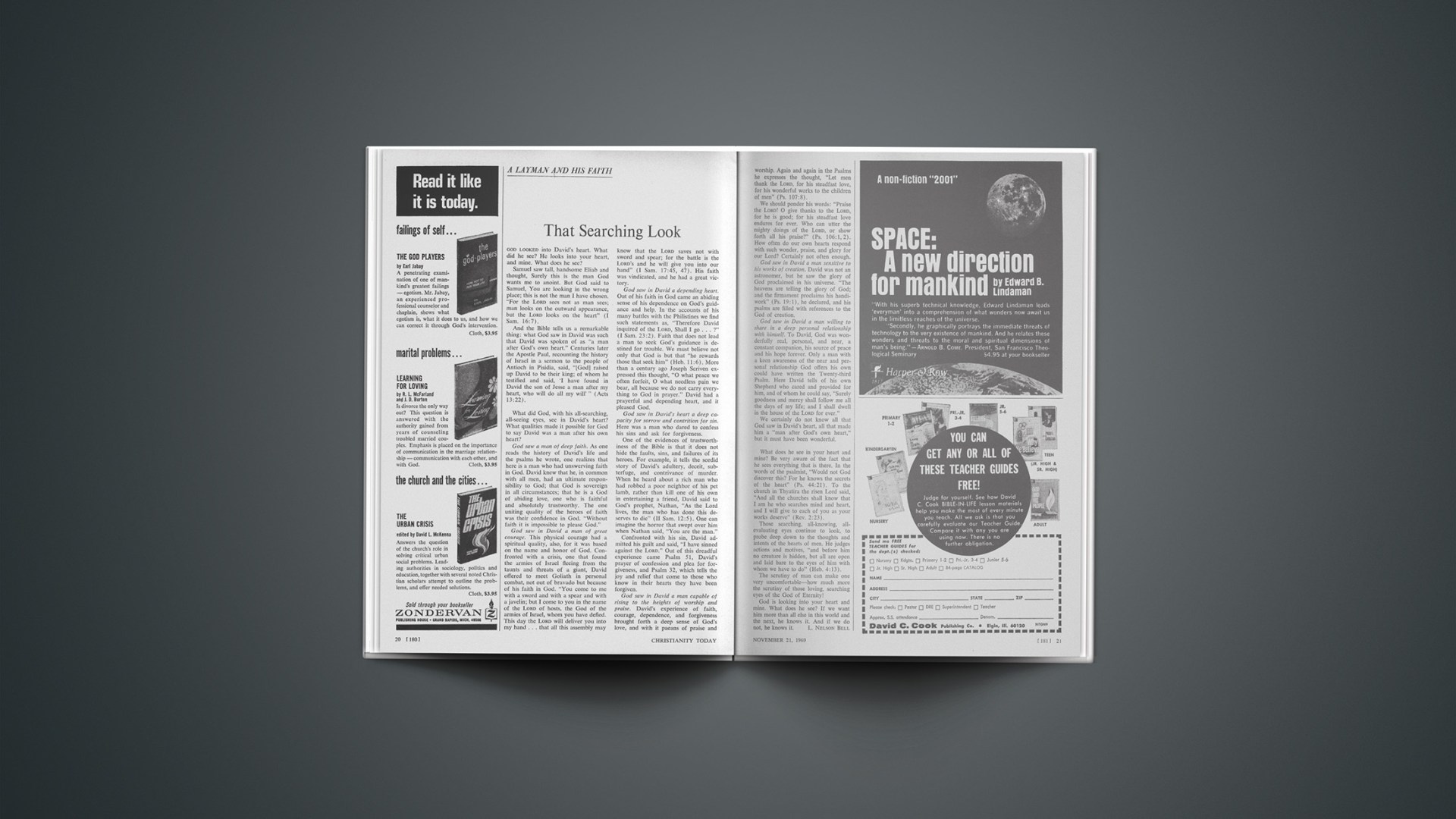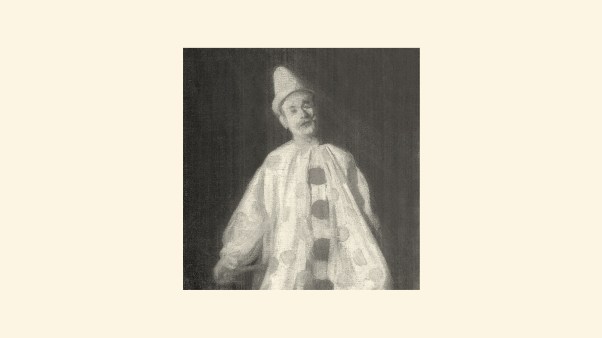God looked into David’s heart. What did he see? He looks into your heart, and mine. What does he see?
Samuel saw tall, handsome Eliab and thought, Surely this is the man God wants me to anoint. But God said to Samuel, You are looking in the wrong place; this is not the man I have chosen. “For the LORD sees not as man sees; man looks on the outward appearance, but the LORD looks on the heart” (1 Sam. 16:7).
And the Bible tells us a remarkable thing: what God saw in David was such that David was spoken of as “a man after God’s own heart.” Centuries later the Apostle Paul, recounting the history of Israel in a sermon to the people of Antioch in Pisidia, said, “[God] raised up David to be their king; of whom he testified and said, ‘I have found in David the son of Jesse a man after my heart, who will do all my will’ ” (Acts 13:22).
What did God, with his all-searching, all-seeing eyes, see in David’s heart? What qualities made it possible for God to say David was a man after his own heart?
God saw a man of deep faith. As one reads the history of David’s life and the psalms he wrote, one realizes that here is a man who had unswerving faith in God. David knew that he, in common with all men, had an ultimate responsibility to God; that God is sovereign in all circumstances; that he is a God of abiding love, one who is faithful and absolutely trustworthy. The one uniting quality of the heroes of faith was their confidence in God. “Without faith it is impossible to please God.”
God saw in David a man of great courage. This physical courage had a spiritual quality, also, for it was based on the name and honor of God. Confronted with a crisis, one that found the armies of Israel fleeing from the taunts and threats of a giant, David offered to meet Goliath in personal combat, not out of bravado but because of his faith in God. “You come to me with a sword and with a spear and with a javelin; but I come to you in the name of the LORD of hosts, the God of the armies of Israel, whom you have defied. This day the LORD will deliver you into my hand … that all this assembly may know that the LORD saves not with sword and spear; for the battle is the LORD’S and he will give you into our hand” (1 Sam. 17:45, 47). His faith was vindicated, and he had a great victory.
God saw in David a depending heart. Out of his faith in God came an abiding sense of his dependence on God’s guidance and help. In the accounts of his many battles with the Philistines we find such statements as, “Therefore David inquired of the LORD, Shall I go …?” (1 Sam. 23:2). Faith that does not lead a man to seek God’s guidance is destined for trouble. We must believe not only that God is but that “he rewards those that seek him” (Heb. 11:6). More than a century ago Joseph Scriven expressed this thought, “O what peace we often forfeit, O what needless pain we bear, all because we do not carry everything to God in prayer.” David had a prayerful and depending heart, and it pleased God.
God saw in David’s heart a deep capacity for sorrow and contrition for sin. Here was a man who dared to confess his sins and ask for forgiveness.
One of the evidences of trustworthiness of the Bible is that it does not hide the faults, sins, and failures of its heroes. For example, it tells the sordid story of David’s adultery, deceit, subterfuge, and contrivance of murder. When he heard about a rich man who had robbed a poor neighbor of his pet lamb, rather than kill one of his own in entertaining a friend, David said to God’s prophet, Nathan, “As the Lord lives, the man who has done this deserves to die” (2 Sam. 12:5). One can imagine the horror that swept over him when Nathan said, “You are the man.”
Confronted with his sin, David admitted his guilt and said, “I have sinned against the LORD.” Out of this dreadful experience came Psalm 51, David’s prayer of confession and plea for forgiveness, and Psalm 32, which tells the joy and relief that come to those who know in their hearts they have been forgiven.
God saw in David a man capable of rising to the heights of worship and praise. David’s experience of faith, courage, dependence, and forgiveness brought forth a deep sense of God’s love, and with it paeans of praise and worship. Again and again in the Psalms he expresses the thought, “Let men thank the LORD, for his steadfast love, for his wonderful works to the children of men” (Ps. 107:8).
We should ponder his words: “Praise the LORD! O give thanks to the LORD, for he is good; for his steadfast love endures for ever. Who can utter the mighty doings of the LORD, or show forth all his praise?” (Ps. 106:1, 2). How often do our own hearts respond with such wonder, praise, and glory for our Lord? Certainly not often enough.
God saw in David a man sensitive to his works of creation. David was not an astronomer, but he saw the glory of God proclaimed in his universe. “The heavens are telling the glory of God; and the firmament proclaims his handiwork” (Ps. 19:1), he declared, and his psalms are filled with references to the God of creation.
God saw in David a man willing to share in a deep personal relationship with himself. To David, God was wonderfully real, personal, and near, a constant companion, his source of peace and his hope forever. Only a man with a keen awareness of the near and personal relationship God offers his own could have written the Twenty-third Psalm. Here David tells of his own Shepherd who cared and provided for him, and of whom he could say, “Surely goodness and mercy shall follow me all the days of my life; and I shall dwell in the house of the LORD for ever.”
We certainly do not know all that God saw in David’s heart, all that made him a “man after God’s own heart,” but it must have been wonderful.
What does he see in your heart and mine? Be very aware of the fact that he sees everything that is there. In the words of the psalmist, “Would not God discover this? For he knows the secrets of the heart” (Ps. 44:21). To the church in Thyatira the risen Lord said, “And all the churches shall know that I am he who searches mind and heart, and I will give to each of you as your works deserve” (Rev. 2:23).
Those searching, all-knowing, all-evaluating eyes continue to look, to probe deep down to the thoughts and intents of the hearts of men. He judges actions and motives, “and before him no creature is hidden, but all are open and laid bare to the eyes of him with whom we have to do” (Heb. 4:13).
The scrutiny of man can make one very uncomfortable—how much more the scrutiny of those loving, searching eyes of the God of Eternity!
God is looking into your heart and mine. What does he see? If we want him more than all else in this world and the next, he knows it. And if we do not, he knows it.
L. NELSON BELL










